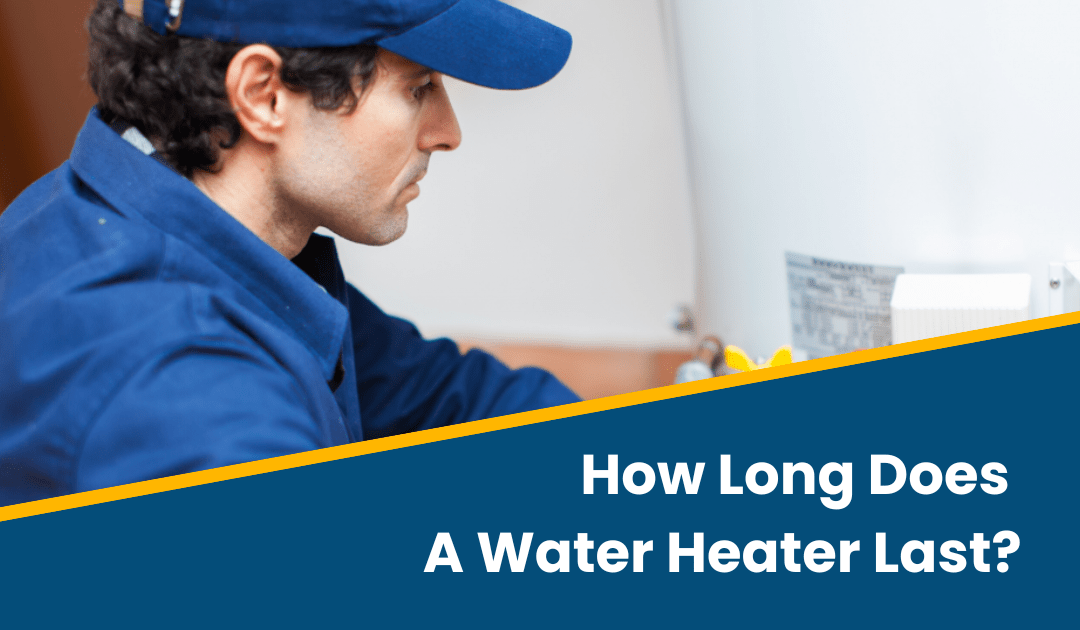In the quiet corners of your home, a vital question lingers: “How long does a water heater last?” This question takes us on a journey into the lifespan of a household cornerstone – the water heater. It’s a tale of endurance, where the longevity of this appliance is influenced by its type, maintenance, and daily use. Each water heater has its own story, marked by years of providing comfort and convenience. Discover the factors that extend its life and learn how to ensure its steadfast service.
Key Takeaways
On average, water heaters last between 6 and 13 years. However, their lifespan can be extended beyond this with proper care and maintenance. Factors influencing the longevity of a water heater include the hot water demand, regular maintenance, type of repairs, and whether it is a tank system or tankless. Tankless water heaters tend to have a longer lifespan because the materials in tank systems wear out sooner.
Knowing the lifespan of your water heater is important
Having an idea of when things might start to go wrong can help you decide whether there is still life in it and a water heater leak means just a repair, or whether it is time to think about replacements. On average, water heaters can last from as few as 6 years up to 13 years. But some can extend even past that with care and not making demands on it that it cannot manage.
The longevity of a water heater has many factors that will affect it, your hot water demand, whether it has seen regular maintenance, the kind of repairs it has seen and whether it is a tank system or tankless. How long a tankless water heater last is not the same as one that uses a tank. Let’s look at how long a water heater lasts in more detail.
Signs to spot that your system needs replacing
Some obvious signs that indicate your water heater lifespan is coming to an end. If you think you are seeing signs that your water heater needs replacing you need to consider your options. Here are some signs that you might see:
- Your system is older than 13 years. When looking at how long does a hot water heater last, anything past 13 years is a bonus and it could go any time.
- Your hot water has a tint or is discolored. It could be from rust or sediment building up in the system. A flush might help (here’s a list of water heater flush kits you can use), but if you are seeing other signs of the water heater reaching the end of its lifespan then it could be that too.
- Turning on the tap and not getting any hot water or a reduced amount compared to before.
- Puddles and leaks or dampness around the water heater itself.
- Unusual noises coming from the tank, like popping or gurgling. They are often caused when the sediment in hard water builds up.
What to think about when replacing your system
It is always best to talk to licensed local plumbers about your water heater life expectancy and what your options are for replacement. You might want to get the same model, or you might want to consider upgrading, moving to something more energy-efficient, or moving to something bigger that better suits your hot water needs. Think about how much hot water you need during your high-use times and how many people are in the home. There are tank models and tankless models, and tankless water heaters have a longer lifespan because the materials tanks are made from wear out sooner.
Common issues and what to do
Here is a look at some of the common issues so think about repairs before you plan for water heater installers to come in with a replacement. Sometimes a good water heater plumber can extend your water heater’s lifespan if you need them to.
- The water is not as hot as it used to be – with an electric water heater. Water heaters can experience temperature fluctuations. For electric water heaters, you should make sure there is still power going to the heater and reset the water heater’s thermostat. Then flush the tank to get rid of the sediment. Replace the thermostat and heating element if needed and insulate the hot water pipes. You could also just try turning the thermostat up. The life of your electric water heater can depend on the right maintenance and care.
- The water is not as hot as it used to be – with a gas water heater. Check the gas is connected still and that the pilot light is on. Also, flush the water heater to get rid of sediment and insulate the pipes. Call in a professional licensed to work with gas and talk to them about your issues, also have them clean the burner if needed, replace certain parts, and do a proper check.
- Sizzling and hissing noises – your plumber should drain the tank until the water is clear and they can remove the elements and clean and de-scale them.
- Leaking from the pressure relief valve – a replacement valve could be used and the water heater may continue working for some time as it can be extended with careful repairs.
- Leaks around the water supply piping – They will tighten fittings to see if that fixes it, if not, some fittings may need replacing.
Final thoughts
In conclusion, understanding the lifespan of your water heater is crucial for maintaining your home’s comfort and efficiency. If you’re facing issues with your water heater or it’s reaching the end of its expected lifespan, it’s wise to consult a professional. Contact a trusted plumber from Best Plumbers Club for expert advice, quality service, and peace of mind. Whether it’s for maintenance, repair, or replacement, skilled plumbers in New Jersey, Virginia, New York, Delaware, and across the US are here to ensure your water heating needs are met with reliability and expertise. Don’t let water heater troubles leave you in the cold – reach out today!







